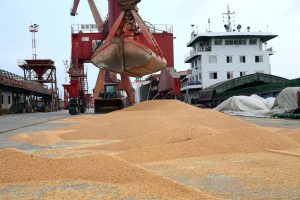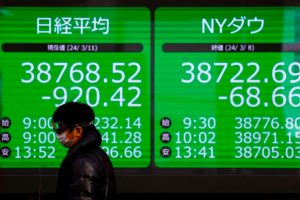China Evergrande Group, the country’s No.2 property developer, has rung the alarm bells amid fears of a debt crunch looming over the real estate sector.
The Evergrande group run by billionaire Hui Ka Yan is offering a 30% discount on properties for a month from Monday in a bid to drastically lower its debts.
Hui Ka Yan told an internal meeting on Saturday that the group wants 100 billion yuan ($14.64 billion) of sales this month and next month (Sept and October), Reuters reported. The goal is 800 billion yuan worth of sales this year – and a cut to its debt ratio, according to a company statement.
The move comes as a crunch looms for China’s real estate developers, who have a combined $85 billion in bond repayments due before the end of the year, as reported by Asia Times Financial in August.
The China Banking and Insurance Regulatory Commission (CBIRC) issued a warning via the media last month that they were worried about the scale of developers interest-bearing debts.
Sources said they would issue “three red lines” for developers because debt repayments are set to peak in coming months, as the maturity of domestic and overseas financed bonds owed by Chinese developers is at least 558.8 billion yuan, 58% more than 2019.
Shortly after, the new finance regulations were outlined by officials (see further details below).
An analysis by Tianfeng Securities found that there are 14 real estate companies among the top 50, based on domestic sales, which exceed the government’s limits.
Largest debt pile
Evergrande, which has the largest debts among developers in China, would offer extra discounts of up to 12% on developments selling at a slow rate, the company said.
The moves come as China seeks to control the level of liquidity in the real estate market, which has seen a recovery from the coronavirus pandemic to date. But there are concerns that the banking system will be overloaded by non-performing loans shortly because of the economic impact from the coronavirus – hence the crackdown on developers with large debt loads such as Evergrande.
“If we can successfully achieve 200 billion yuan sales during the ‘golden and silver months’ of September and October, it means…it’ll give us a solid base for achieving the 800 billion yuan internal sales target,” Evergrande said.
Evergrande posted 450.6 billion yuan in sales in the first eight months of 2020, 22% higher than a year ago.
A 22-25% discount and an aggressive online promotion campaign in February and March of this year also helped the firm record bumper transactions as the market suffered from the coronavirus pandemic. But the increase in sales from the heavy discounts, have come at cost to margins. Evergrande posted last week a core profit of 19.3 billion yuan in the first six months of this year, 36.5% lower than 30.4 billion yuan a year ago.
Real estate sector’s domestic bond financing drops
In August, the net financing of real estate companies’ domestic bonds fell sharply compared with July.
According to Wind data and the China Securities Regulatory Commission, the total amount of domestic bonds issued by real estate enterprises in August was 69.7 billion yuan (a rise of 11.7% from 2019 but a small drop from July).
However, due to the large maturity of credit bonds of real estate businesses in August, the net financing of domestic bonds of real estate enterprises fell by -6.9 billion yuan, a sharp decrease from 15.6 billion yuan in July.
Chinese media outlet ‘The paper’ reported on August 20, that officials from the central bank and the Ministry of Housing and Urban-Rural Development met with developers to outline the new capital monitoring and financial management rules for key real estate companies.
At the meeting, officials clarified “three red lines” for tightening financing for real estate developers. These new regulations led to a sharp decline in domestic real estate net financing in August, while overseas financing showed a significant increase.
In August, net financing of overseas bonds issued by real estate companies reached $8.14 billion, a year-on-year increase of 242% and a month-on-month increase of 4.37%.
With reporting by Jim Pollard, plus Clare Jim of Reuters
























